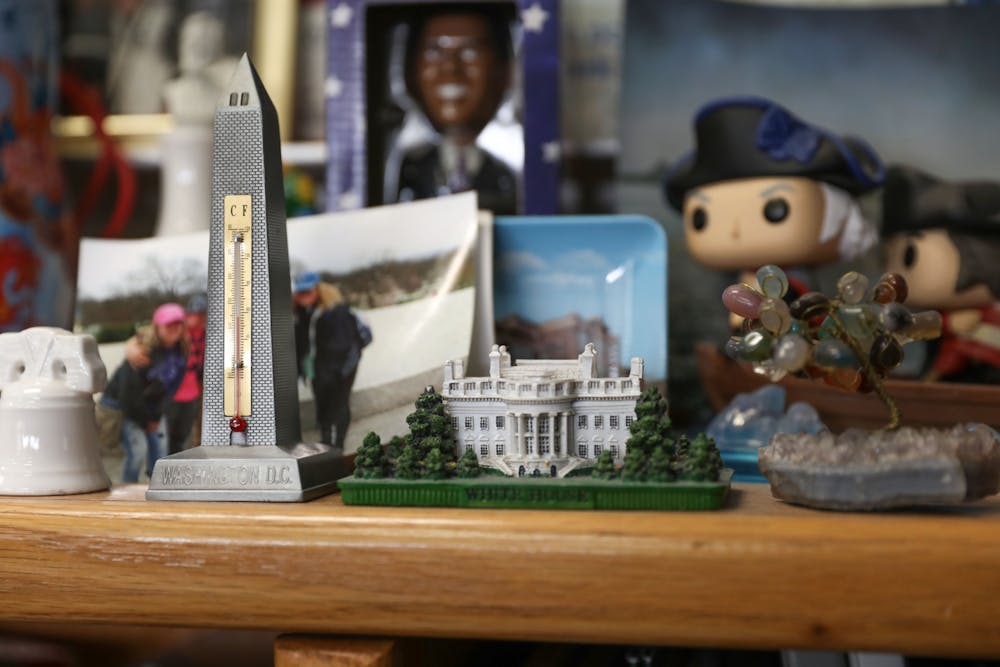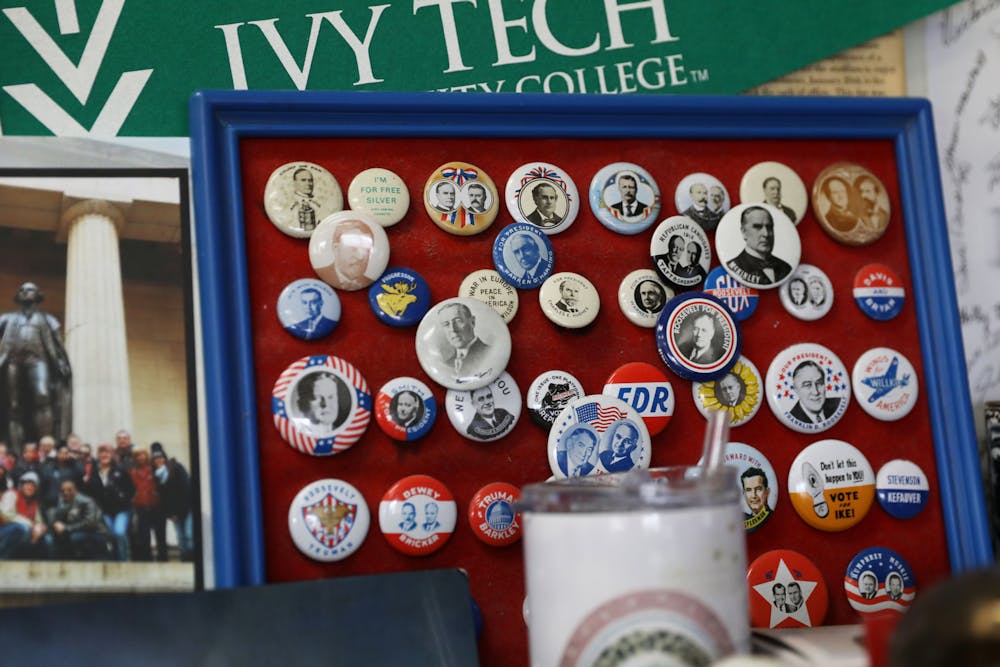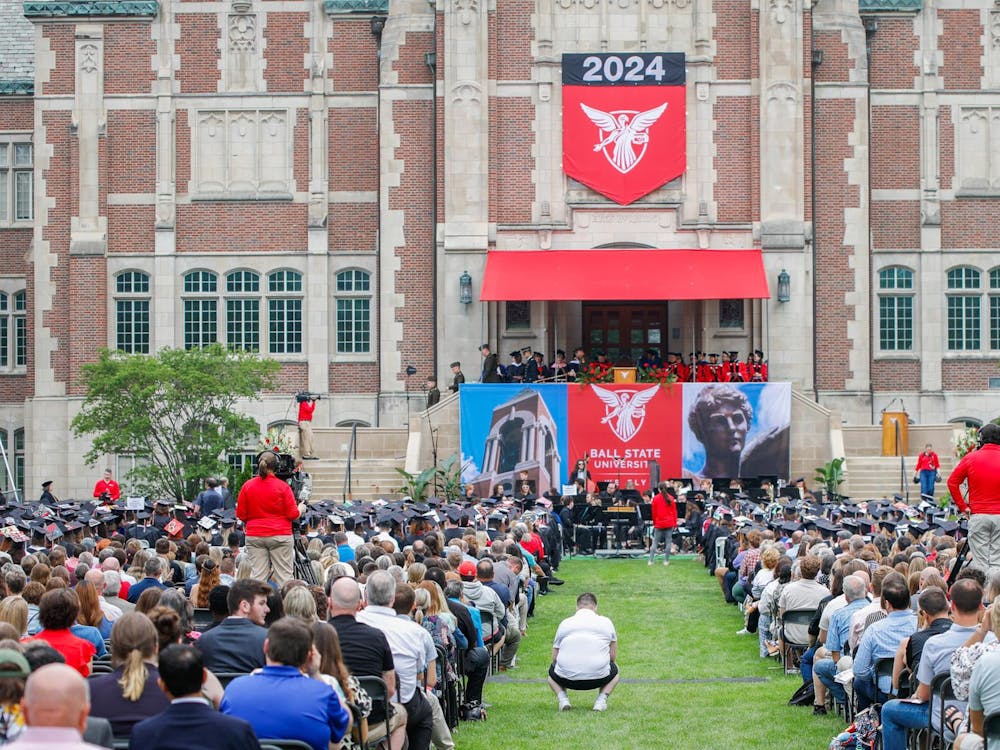Editor's Note: This story is part of The Partnership Project, a series of content written in an effort by The Daily News to follow the formal collaboration of Ball State University and Muncie Community Schools. Read more in this series here.
Ball State University professors and Muncie Community Schools (MCS) administration are seeking to change what civics means to students throughout Muncie and beyond.
In 2022, Ball State was one of six grantees that received the American History and Civics-National Activities Grants, according to the United States Department of Education, Office of Elementary and Secondary Education. The university received a little more than $1.3 million to be funded over the course of three years for their Civic Renewal through Education for Agency, Tolerance and Engagement (CREATE) project. The grant is one of two Indiana-related grants with the other belonging to Purdue University with PROJECT RISE.
According to the abstract of the project submitted to the U.S. Department of Education, Office of Elementary and Secondary Education, “CREATE will impact roughly 5,215 students and 335 teachers … We selected MCS as the target population to engage underserved populations with a scalable model for civic renewal and exposure to opportunities for public service.”
The project is also meant to assist MCS to create a curriculum in order to fulfill the new requirements of Indiana Code Title 20, Article 30, Chapter 5 on a required one-semester civics class for students in sixth-eighth grade starting in the 2023-24 school year. The creation of the law places Indiana alongside six other states that have a middle school course solely devoted to civics education.
David Roof, co-principal investigator of the project and associate professor of educational studies, shared how the law was part of a national effort.
“A lot of students around the country right now only get one civics-related class, and it's often the last year, often the last semester, of high school before people graduate,” Roof said. “Civics has been really lacking in schools. There's a wide bipartisan agreement that there's a need to reinstitute civics.”
Roof is not alone in working on the project. He is joined by his co-principal investigator Anand Marri, interim provost and executive vice president for academic affairs and professor of educational studies, as well as Ball State professors from a variety of areas including journalism, educational psychology and multicultural education, according to the Aug. 25, 2022 press release on the project.
Since that announcement, the team has also grown to include Donna Browne, who became the CREATE project director in January, according to the February 2023 newsletter of the project.
Now, the project is nearly seven months in and has already begun to set roots with an online repository for teachers on the CREATE project website, along with professional development seminars in partnership with the Indiana Bar Foundation for teachers to prepare to implement civics into their courses.

Roof said he has already seen the influence of the CREATE project. He mentioned getting emails from teachers around the state as many work to meet the new civics requirement.
“I know a teacher in West Lafayette emailed me and said, ‘We have this new class requirement, but we don't know what to do. Can you share anything?’” Roof said about one email. “Long term, we really want to be there to support and [be] really focused on Muncie but also providing resources statewide for teachers.”
The resources in question are part of the Ball State team’s mission as they, alongside MCS teachers, formulate a curriculum to meet the requirement and beyond.
Marri provides insight on the curriculum. He has been conducting research on the development of actively engaged democratic citizens since he was in graduate school in 1999. He said the research has shown a better understanding of economic factors makes you a better citizen.
“For example, in Indiana, we do a lot on solar farms or windmills,” Marri said. “So what are the incentives that people are paying landowners to put that there? What are the costs that are involved, and how does that affect me? How does that affect the electricity rates? There's a variety of ways that this bill allows for researchers like me to get kids to think about civic engagement.”
Marri’s additional experience as a former high school social studies teacher in California also showed him firsthand the disparities of civic engagement the grant will help to alleviate. He said he noticed how students from lower and moderate-income families, as well as those of color and non-native English speaking backgrounds, had fewer civic engagement opportunities. Civic engagement is a core part of the CREATE project as it seeks to build opportunities for students to become better citizens from K-12.
“Muncie Community Schools have a lot of challenges, but there's also a lot of opportunities,” Marri said. “A lot of the teachers and the students are civically engaged. They care about their community, they care about Delaware County and they care about Indiana. And so this is an opportunity to build up on that momentum and improve civic education across subject areas beyond just civic education in social studies, now it's across all areas.”
The project will implement all aspects of civics, which is often confused for being only related to government. Julie Snider, a social studies teacher and department chair at Muncie Central High School, recalled how many have used the words interchangeably when referring to her classes, including her own mother.

“When I first started teaching government, I remember my mom saying, ‘Oh, you're gonna be teaching civics,’” Snider said, recalling how she was confused by her mother’s words. “And she said, ‘Well, that's what they always called it when I was a kid.’ And that was kind of the first time I started looking into what that meant. I thought, ‘That doesn't go with my government curriculum, that would be something I would have to teach alongside it.’”
Civics itself is related to being a citizen, which reaches into many areas from media to science, music to sustainability.
The topics can be covered across many areas and seek to find ways to work with teachers rather than against them; one way they do that is through the work of Julie Snider as she works with teachers to implement the curriculum.
“We've had a good response,” Snider said. “But we have full plates all the time, especially subjects where they have testing and things like that. Sometimes, they tend to say, ‘I can't handle more.’ My job has been trying to show them: ‘It's everything you're already doing but just doing it in a different way. Giving your kids a choice … have a discussion in your class, talk with them about how to talk and how to disagree with someone in a way that's civil.’”
Snider also talked about the new civics requirement and how it will be implemented in schools, including those beyond MCS.
“What I hope doesn't happen is that everybody just expects that sixth-grade teacher to teach those kids civics, and nobody has to do anything else because that won't work,” Snider said. “That's like saying the only time we're ever gonna talk about government is when they're seniors. No, we're a community; we all have to do it. We all have to teach kids from kindergarten and on the idea of civics.”
Currently, the part of the project that will help MCS sixth-grade teachers meet the new 2023-24 requirement will be tested in around four months at the start of the next school year. Northside Middle School principal Ben Williams is hopeful for its success.
As part of the efforts to help students understand civics in real time, Williams has had trips with student leaders to places such as the Indiana Statehouse.
“[They were able to] sit and learn about those processes and history, understanding that the current laws that are being debated and some of the topics that are being contested directly affect their lives today,” Williams said.
The trip was just one of many. Williams shared future hopes of more field trips and projects to get students more civically engaged. Back at the high school level, Snider has been sending her students to local council meetings.
“They don't just go to city council meetings,” Snider said. “They have to present a resolution that they want to get passed, and we go to the school board meetings, and they have to present ideas in front of the school board. This idea of don't just sit back and be a resident of Muncie, be an active participant in what's happening in your community. Because if you don't, we're gonna have roads that you're not happy with. You're gonna have programs that you don't like, so do something about it.”
She said she has even been reminding students they only have to be 18 years old to run for mayor. Students in her class this past November were involved in the election as poll workers and saw how they noticed things such as how many voted “straight ticket,” when a voter selects all nominees of a political party for partisan offices on a ballot, according to the National Conference of State Legislatures.
The idea from Williams, Snider and others on the project is to get students to experience civics beyond the classroom, so they can apply the lessons learned to their lives.
Snider said she has a desire for future partnerships with Ball State academic departments, such as the political science department, recycling entities, local businesses and anyone else who wants to help students get experience outside the classroom.
“My vision for the CREATE project is to not only create wonderful opportunities for our students and our teachers but then to create some sustainability for that,” Chuck Reynolds, superintendent of MCS, said. “After the grant has gone, we have curated resources, embedded opportunities for field trips and then real-world experiences that were kickstarted by the project.”
Reynolds and others know students may not stay in Muncie, so they prepare them for life beyond town borders.Wherever they end up, the project seeks to create citizens that go beyond boundaries.
“Kids growing up in a community that realize they have a purpose,” Williams said, “it will make our democratic society, not only just in Muncie and Delaware County and Indiana but throughout the United States and throughout the world … that's a powerful frame when you look at it from the lens [of] ‘I'm not just a person of the city of Muncie, I'm also a member of our world. What can I do to make the world a better place?’”
Contact Abigail Denault with comments via email at abigail.denault@bsu.edu.





